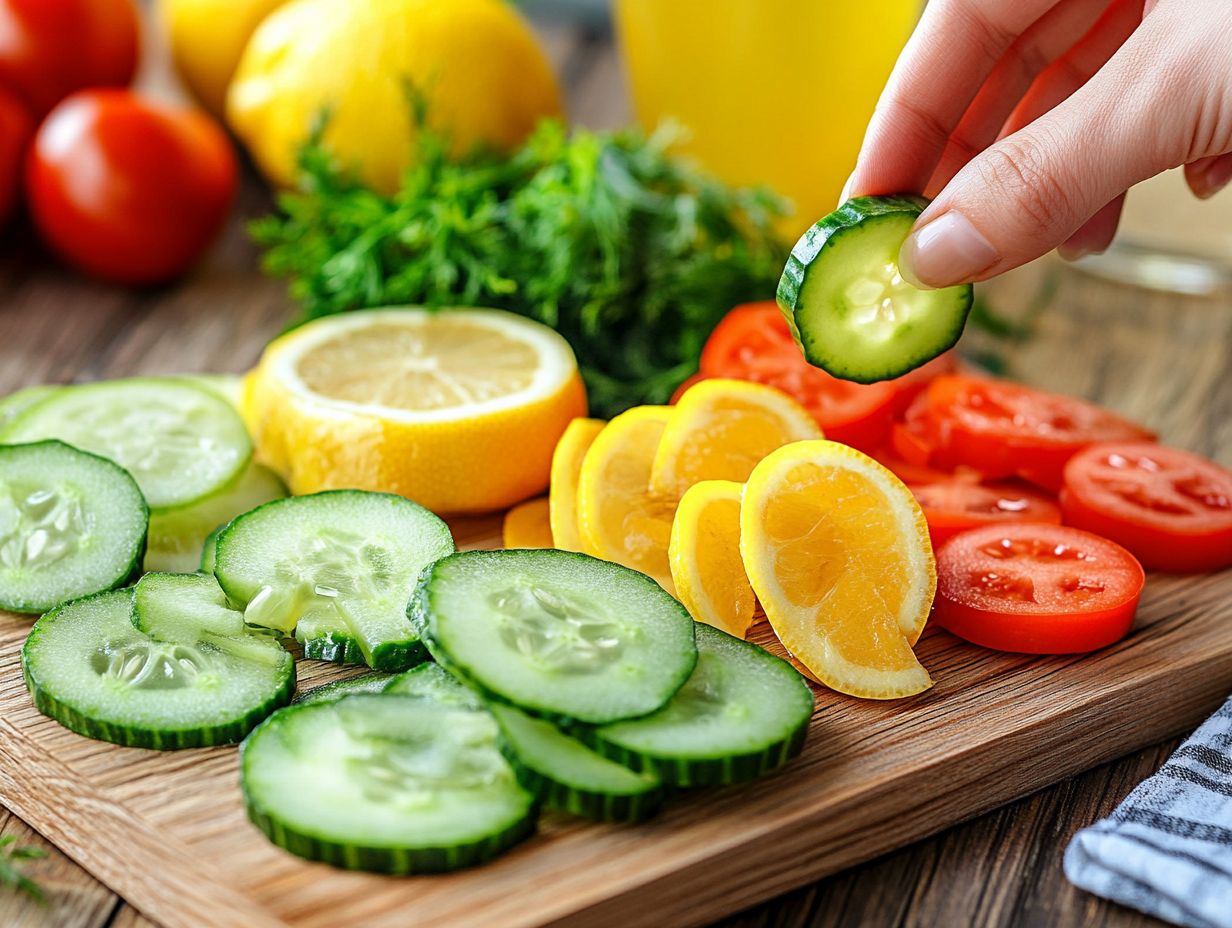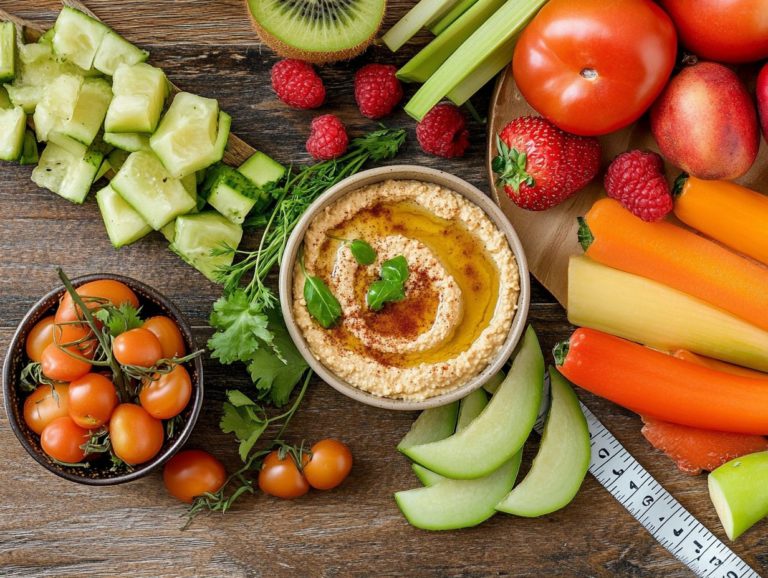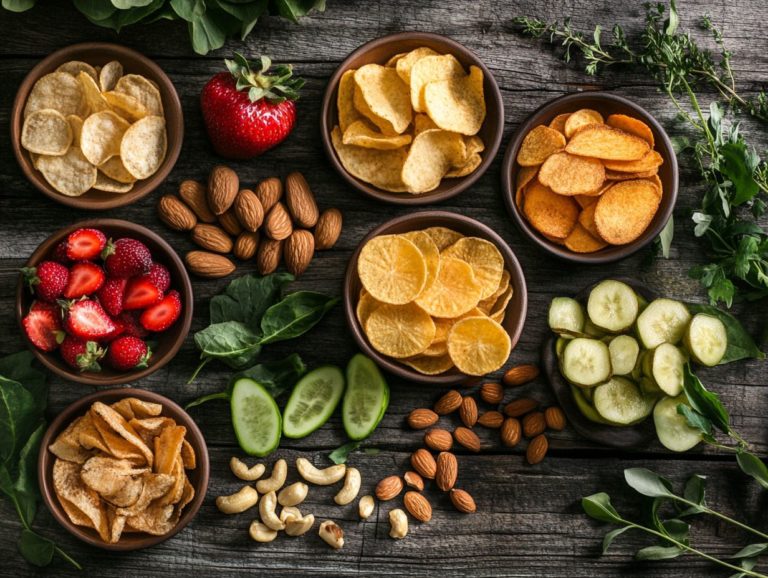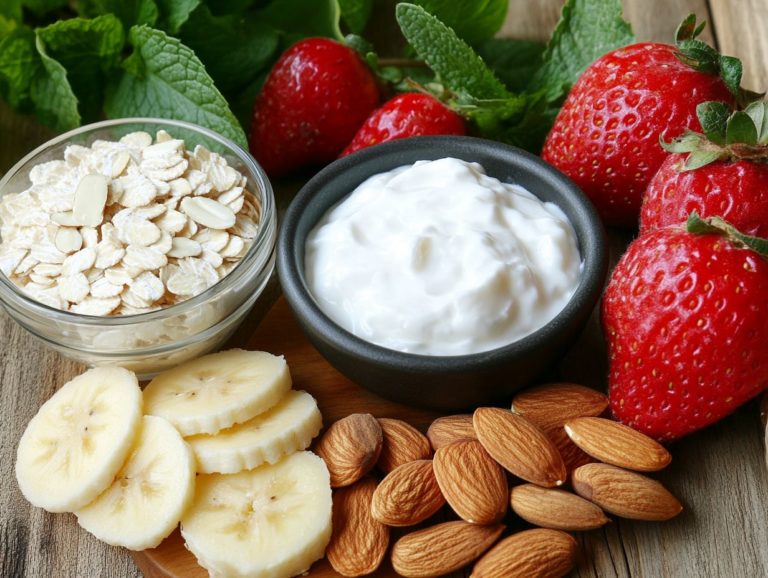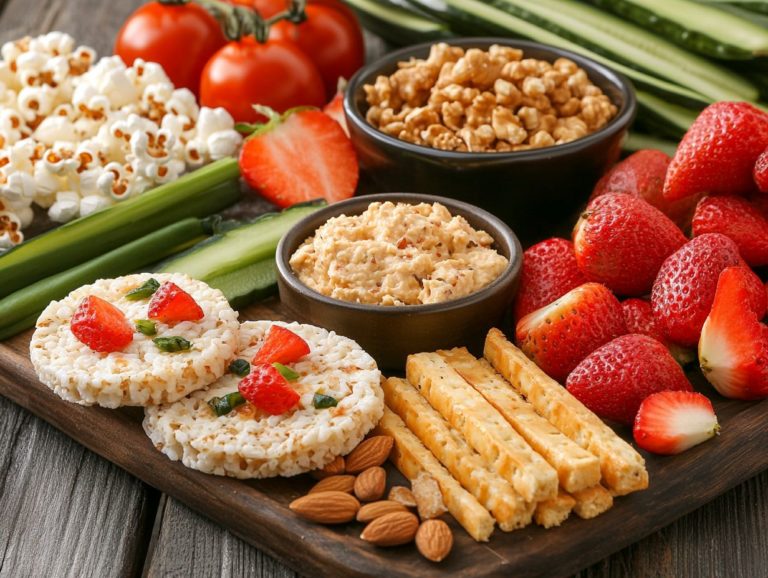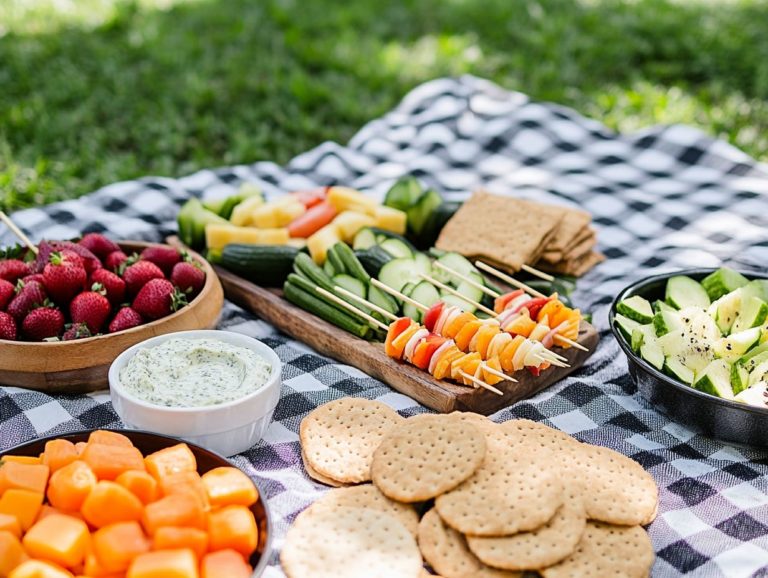How Low-Calorie Snacks Can Fit in Your Lifestyle
Incorporating low-calorie snacks into your diet can truly transform your health and well-being.
These delightful treats not only assist with weight management but also deliver essential nutrients while effortlessly satisfying your hunger.
From curbing cravings to making informed choices, this guide explores the myriad benefits of low-calorie snacks, offers insights on selecting them wisely, and provides practical examples to keep you energized throughout the day.
Remember, small changes can lead to remarkable results!
Contents
- Key Takeaways:
- Why Should You Incorporate Low-Calorie Snacks into Your Diet?
- How to Choose Low-Calorie Snacks?
- 3. Consider Portion Size
- What Are Some Examples of Low-Calorie Snacks?
- How to Incorporate Low-Calorie Snacks into Your Lifestyle?
- Keep Healthy Options on Hand
- Substitute Unhealthy Snacks with Low-Calorie Options
- Listen to Your Body’s Hunger Cues
- Frequently Asked Questions
- 1. What are low-calorie snacks and how can they fit into my lifestyle?
- 2. Are low-calorie snacks only for people trying to lose weight?
- 3. How do I know if a snack is truly low in calories?
- 4. Can low-calorie snacks still be tasty and satisfying?
- 5. How can I incorporate low-calorie snacks into my daily routine?
- 6. Can low-calorie snacks be filling and keep me satisfied until my next meal?
Key Takeaways:
Why Should You Incorporate Low-Calorie Snacks into Your Diet?
Incorporating low-calorie snacks into your diet is essential for maintaining a balanced lifestyle. These snacks not only aid in weight management but also provide the necessary nutrients to satisfy your hunger and help control those pesky food cravings.
Experts from the Cleveland Clinic emphasize that such snacks can offer a metabolism boost, support your energy levels throughout the day, and reduce the risk of chronic conditions like obesity, diabetes, and heart disease, which are unfortunately all too common today.
A recent 2023 Food and Health Survey underscores the growing trend of planned snacking, highlighting its importance for meeting nutritional needs and enhancing overall health.
1. Aid in Weight Management
Low-calorie snacks are essential for effective weight management, allowing you to maintain a healthy calorie intake while still relishing your food. By planning your snacks thoughtfully, you can select options that are low in energy density but high in fiber and healthy fats. This approach promotes satiety without pushing you over your daily calorie limits.
Incorporating these snacks into your diet can significantly decrease the likelihood of overeating during meals and ensures a balanced nutritional intake throughout the day. Foods rich in fiber slow down digestion, providing a lasting sense of fullness, while healthy fats deliver essential nutrients without adding excessive calories.
Adopting a mindful approach to snacking, where you control portion sizes and prioritize nutrient quality, further enhances your long-term health goals. Ultimately, these strategies not only help you manage your weight but also foster positive eating habits, paving the way for a more sustainable lifestyle.
2. Provide Nutrients and Satisfy Hunger
Healthy snacks serve as an excellent way for you to provide essential nutrients and satisfy your hunger between meals, keeping your energy levels high throughout the day. By opting for protein-rich snacks like cottage cheese and Greek yogurt, along with an array of fruits and veggies, you not only enhance your nutrient intake but also support your hydration, making snacking a valuable addition to your diet.
Incorporating nuts and seeds into your snacking routine can offer a generous dose of healthy fats and fiber, both of which are vital for heart health and digestive efficiency. If you’re in the mood for something more refreshing, consider smoothies loaded with leafy greens, bananas, and a splash of almond milk. These can deliver a powerful punch of vitamins while ensuring you stay hydrated.
Whole grain crackers teamed with hummus or guacamole provide a satisfying crunch along with a diverse range of nutrients, boosting both your mental and physical performance throughout the day. By selecting healthy snacks, you can effortlessly enrich your diet and meet your daily nutritional needs.
3. Help Control Cravings
You can effectively control food cravings by strategically incorporating low-calorie snacks into your diet, helping to maintain stable blood sugar levels and preventing those impulsive eating moments. By practicing mindful eating and selecting healthy alternatives, you empower yourself to curb cravings and sidestep the allure of processed foods that often lead to unhealthy eating habits.
Mindful eating is about being fully engaged during your meals. Take the time to savor the taste, texture, and aroma of your food. This practice can significantly diminish the likelihood of overeating. Including healthy snacks such as fruits, nuts, or yogurt creates a buffer against those pesky sugar spikes and crashes that trigger cravings. Recognizing how processed foods cause energy dips is crucial to your health journey!
Focusing on foods rich in nutrients not only helps you manage cravings but also enhances your overall health. It leads to sustained energy levels and a more balanced diet, setting the stage for long-term wellness.
How to Choose Low-Calorie Snacks?
Key Considerations
When selecting the perfect low-calorie snacks, consider several key factors. Pay attention to the types of whole foods you choose, take the time to understand nutrition labels, and be mindful of portion sizes.
By prioritizing whole, nutrient-rich options like fruits, vegetables, and protein-rich snacks, you ensure that your snacking habits support your health goals. This approach promotes mindful eating and satisfies your hunger without the risk of overindulgence.
1. Look for Whole Foods

When selecting low-calorie snacks, it s essential to prioritize whole foods. They are brimming with vital nutrients, fiber, and beneficial compounds. Healthy options like fresh fruits, crisp vegetables, and protein-rich snacks allow you to meet your nutritional needs while keeping your calorie intake in check.
By opting for whole foods instead of processed alternatives, you minimize your consumption of additives and artificial ingredients. For example, choosing raw almonds over a sugary granola bar provides quality protein while delivering healthy fats and fiber that promote satiety.
Consider pairing carrot sticks with hummus for a satisfying snack that delivers essential vitamins while effectively curbing your hunger. Whole foods generally have lower glycemic indices, aiding in better blood sugar management, making them an intelligent choice for sustained energy levels.
Incorporating more whole foods into your snacking routine can significantly enhance your overall wellness and foster healthier eating habits.
2. Check the Nutrition Label
Checking the nutrition label is an essential step in your quest for low-calorie snacks. It reveals the calorie content and ingredients lurking within. Being mindful of what you consume gives you the power to make informed choices that align with your health goals, ensuring that your snack options are not just healthy, but genuinely contribute to your overall diet.
As you examine the label, pay close attention to the serving size; this detail can greatly affect how many calories you consume. A snack that appears low in calories may actually contain multiple servings, leading you down the slippery slope of unintended overeating.
Scanning the ingredient list is equally important, as it helps you spot any added sugars or unhealthy fats that could derail your mindful eating efforts. Whenever possible, opt for snacks featuring whole, recognizable ingredients, as they re more likely to support your journey toward a balanced diet.
Understanding these nutrition label aspects empowers you to make better snack choices that not only satisfy your cravings but also bolster a healthier lifestyle.
Start incorporating these tips into your daily habits for a healthier, more balanced approach to snacking!
3. Consider Portion Size
Considering portion size is crucial when selecting low-calorie snacks to effectively manage your calorie intake while keeping hunger at bay. By embracing mindful eating and serving appropriate portions, you can sustain your energy levels throughout the day and sidestep the traps of overeating.
This strategy also helps achieve your dietary goals and cultivates a deeper appreciation for food. Start by measuring out individual servings rather than diving straight into the package, which can lead to an unintentional calorie overload.
Utilize small bowls or snack bags to visually limit your portions, making it easier to adhere to your planned amounts. Tune into your hunger cues and allow yourself to savor each bite, fostering a more gratifying snacking experience.
Pairing this approach with a variety of healthy options ensures a balanced intake of nutrients, ultimately supporting better dietary habits and sustained energy throughout your day.
What Are Some Examples of Low-Calorie Snacks?
Regarding low-calorie snacks, you have a wealth of delicious and nutritious options at your fingertips, perfectly aligned with your health goals. By incorporating fruits and vegetables, whole grains, and protein-rich choices like Greek yogurt, you not only satisfy your cravings but also enhance your overall nutrition.
Embrace the variety and discover how these mindful selections can elevate your snacking experience.
1. Fruits and Vegetables
Don t overlook fruits and vegetables! They are the perfect low-calorie snacks that deliver a generous dose of fiber and hydration, effectively curbing your hunger while supplying essential nutrients.
- Carrot sticks
- Cucumber slices
- Apple wedges
Not only are they delicious, but they also keep the calorie count low, making them ideal for any snacking occasion. These nutritious choices are rich in vitamins and minerals that significantly contribute to your overall health.
Bell peppers offer a satisfying crunch along with a hearty dose of vitamin C. Cherry tomatoes provide a hydrating burst of flavor and antioxidants.
Berries, such as strawberries and blueberries, not only tantalize your taste buds but are also low in calories and packed with fiber, making them an excellent addition to yogurt or simply delightful on their own.
For an extra touch, consider adding a sprinkle of cinnamon or a squeeze of lemon juice. These simple enhancements can elevate your healthy snacks, boosting both taste and nutritional benefits without sacrificing their low-calorie allure.
2. Whole Grain Crackers and Hummus
Whole grain crackers paired with hummus make for a delightful and nutritious low-calorie snack that s brimming with healthy fats and protein. This combination not only delivers essential nutrients but also keeps your energy levels soaring, making it an ideal choice at any time of day.
These wholesome snacks stand out for their impressive fiber content, which aids digestion and helps maintain that satisfying feeling of fullness for longer. The fiber from whole grains fosters gut health and contributes to a well-rounded diet.
The plant-based protein in hummus enhances satiety and supports muscle maintenance. Plant-based protein, which comes from legumes and grains, is essential for muscle maintenance.
The healthy fats derived from tahini or olive oil in hummus play a vital role in promoting heart health and overall wellness. By incorporating this delicious duo into your daily routine, you not only curb your hunger but also embrace a healthier lifestyle, making it an irresistible option for anyone in search of nutritious, low-calorie alternatives.
Try these delicious snacks today and feel the difference in your energy levels!
3. Greek Yogurt and Berries

Greek yogurt topped with fresh berries is a delightful, protein-rich snack that remains low in calories while offering a treasure trove of nutrients. This option aids in hydration and supplies essential vitamins, making it an excellent choice for a midday pick-me-up or post-workout recovery.
The harmonious blend of creamy yogurt and sweet, juicy berries satisfies cravings and keeps your energy levels steady. The high protein content in Greek yogurt supports muscle repair and helps you feel full, which is particularly beneficial if you’re managing your weight.
The antioxidants in berries boost your health, strengthen your immune system, and promote skin vitality. Together, they create a nourishing snack that fosters healthy eating habits while being mindful of calorie intake. This makes it an ideal choice for anyone looking to elevate their nutritional routine.
4. Air-Popped Popcorn
Air-popped popcorn is a fantastic low-calorie snack that offers whole grains and a generous amount of fiber, keeping you satisfied. This light and crunchy delight is a wonderful alternative to traditional snacks, perfect for enhancing your movie nights or serving as a quick midday treat.
It not only packs essential nutrients but also fits effortlessly into a healthy eating plan. With its rich dietary fiber content, air-popped popcorn aids digestion and helps regulate blood sugar levels.
As a whole grain food, it supports heart health and may lower the risk of chronic diseases. Its versatile flavor profile allows you to season it to match your taste preferences, making it a fun snack for everyone while keeping those low calorie counts.
Air-popped popcorn is your perfect guilt-free snack choice that doesn t skimp on nutrition.
5. Hard-Boiled Eggs
Hard-boiled eggs are an exceptional choice for a low-calorie, protein-rich snack that provides essential nutrients and healthy fats. They re incredibly versatile and easy to prepare, allowing you to enjoy them solo or pair them with various wholesome accompaniments.
By incorporating these nutrient-dense gems into your diet, you can maintain energy levels throughout the day while supporting muscle health and enhancing your fullness. Each egg packs about 6 grams of high-quality protein, making it a satisfying snack that aligns perfectly with a balanced diet.
The healthy fats found in hard-boiled eggs promote heart health and deliver a longer-lasting energy boost compared to processed snacks. You can slice them onto a salad, mash them into avocado toast, or simply savor them with a dash of salt and pepper.
How to Incorporate Low-Calorie Snacks into Your Lifestyle?
Incorporating low-calorie snacks into your lifestyle is seamless when you plan ahead and ensure that healthy options are always within reach.
Pay attention to your body’s hunger cues and practice mindful eating. This will help you make informed choices that align with your nutritional goals and enhance your hydration throughout the day.
1. Plan Ahead
Planning ahead is crucial for incorporating low-calorie snacks into your routine. Select healthy options that meet your nutritional needs. When you prepare snacks in advance, you can avoid impulsive eating and ensure wholesome choices are always available.
This proactive approach saves you precious time on hectic days and minimizes the temptation to choose unhealthy convenience foods. Think about versatile ingredients that can be easily portioned, such as chopped fruits, yogurt, or whole grain crackers paired with nut butter.
Store these snacks in clear, labeled containers for easy access, making it a breeze to grab a nutritious option while on the go. Additionally, planning your weekly snack menu invites you to experiment with new flavors and combinations, helping you cultivate healthier snacking habits while keeping your routine lively and engaging.
Keep Healthy Options on Hand
Keeping healthy options within reach is crucial for successful snacking. Ensure that you have convenient access to low-calorie choices whenever hunger strikes.
By thoughtfully stocking your pantry and fridge with nutritious selections, you can effortlessly meet your nutritional needs and stay hydrated throughout the day.
This proactive preparation helps you avoid impulsive eating and boosts your overall wellness. Consider filling your shelves with delightful items like:
- Air-popped popcorn
- Yogurt-covered raisins
- Colorful vegetable sticks paired with hummus
Small bags of nuts or seeds offer a satisfying crunch while providing healthy fats and protein. And don t overlook the importance of hydration; keep plenty of water, herbal teas, or infused water options nearby to maintain optimal hydration levels.
When you prioritize nutrition and ensure that wholesome snacks are readily available, the likelihood of making healthier choices significantly rises. This leads to improved energy and mood throughout your day.
Substitute Unhealthy Snacks with Low-Calorie Options

Substituting unhealthy snacks with low-calorie options can transform your snacking habits and elevate your overall health. Make conscious choices and select healthier alternatives to savor snacking while dramatically reducing your calorie intake.
For instance, think about swapping potato chips for air-popped popcorn lightly sprinkled with sea salt and your favorite herbs. This straightforward adjustment not only cuts down on calories but also delivers that delightful crunch you crave. To learn more about incorporating healthier options, check out this guide on how to balance low-calorie snacks in your diet.
Likewise, instead of reaching for sugary snacks like candy bars, indulge in a piece of dark chocolate or a handful of mixed nuts. This shift can satisfy your sweet tooth while providing valuable nutrients.
Be deliberate with your snack choices to enjoy treats without the accompanying guilt, fostering a healthier relationship with food. This mindful approach encourages you to relish vibrant fruits or crisp veggies.
Listen to Your Body’s Hunger Cues
Listening to your body’s hunger cues is essential for building a good relationship with food and honing effective snacking habits. Tune into these signals to discern when it’s the right time to snack.
This ensures that your choices complement your hydration needs and nutritional aspirations while supporting energy levels and boosting your metabolism.
Recognizing these cues helps you prevent overeating and promotes a more satisfying eating experience. It s vital to distinguish between genuine hunger and emotional cravings to steer towards healthier choices.
To embrace mindful eating, consider keeping a food diary to track what and when you snack, fostering greater awareness. Incorporating hydrating snacks such as fruits, vegetables, and protein-rich snacks like nuts or yogurt can elevate your overall nutrient intake and assist in managing your hunger levels.
This holistic approach highlights the essential connection between hydration and food, paving the way for optimal health and weight loss.
Frequently Asked Questions
1. What are low-calorie snacks and how can they fit into my lifestyle?
Low-calorie snacks are foods that are low in calories but still provide a satisfying and nutritious option for snacking. They can fit into your lifestyle by being a convenient and guilt-free option for when you need a quick pick-me-up or a light meal replacement. Including healthy snacks, such as fruits and veggies, can be a great start.
2. Are low-calorie snacks only for people trying to lose weight?
No, low-calorie snacks can be enjoyed by anyone looking to maintain a healthy and balanced diet. They can also be beneficial for those trying to manage their weight, as they can help control portion sizes and reduce overall calorie intake. Planned snacking with low-calorie options can support your nutrition needs.
3. How do I know if a snack is truly low in calories?
Always check the nutrition facts on the packaging and serving size on packaged snacks to determine their calorie content. A low-calorie snack typically contains 100 calories or less per serving. Consider the fiber content and energy density the number of calories in a given volume of food of the snack as well.
4. Can low-calorie snacks still be tasty and satisfying?
Absolutely! There are plenty of delicious low-calorie snack options available, such as fruits, vegetables, air-popped popcorn, and flavored rice cakes. Don t wait start experimenting with vibrant flavors today to discover your favorite healthy snacks! Adding protein-rich snacks and healthy fats like cottage cheese or Greek yogurt can enhance their taste and satisfaction.
5. How can I incorporate low-calorie snacks into my daily routine?
Plan ahead and pack low-calorie snacks to bring with you to work, school, or on-the-go. Try replacing higher calorie snacks with low-calorie options, such as swapping chips for carrot sticks or soda for sparkling water. Including whole grains, fruits and veggies, and hydration in your daily snacking routine can be beneficial.
6. Can low-calorie snacks be filling and keep me satisfied until my next meal?
Yes, as long as the snacks are well-balanced and include a combination of protein, fiber, and healthy fats. This will help keep you feeling full and prevent overeating. Examples of filling low-calorie snacks include Greek yogurt with fruit, hummus and veggies, or a small handful of almonds. Avoiding processed foods and focusing on natural options like salmon and leafy greens can also be helpful.

